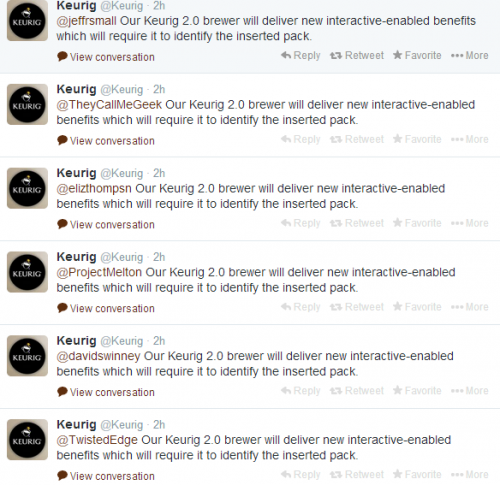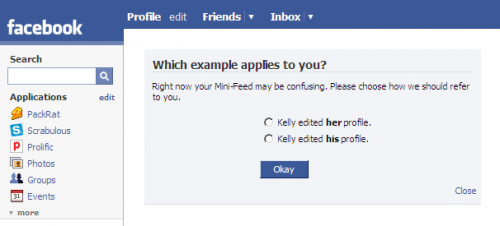The 2014 Theorizing the Web (#TtW14) committee is excited to announce that we will partner with Interface, an open access journal, to publish a special issue based on papers form the TtW14 conference program. The special issue will include peer-reviewed articles and non-peer-reviewed essays, as well as invited panel reviews. All TtW14 presenters are welcome to submit. Look below the jump to learn why we selected Interface as our platform. more...

Last February, I – piggybacking off a great short essay by Ed Felter on what he called “Property Rights Management” – said that I wouldn’t be surprised to see things like DRM making their way into other devices that don’t explicitly have to do with the kinds of software and firmware in which we’re accustomed to seeing DRM.
Literally one year later: Keurig!
The moral of the story is always listen to me.
Today’s post is a reply to Robin James’ post, which raises questions stemming from the observations made in Jodi Dean’s recent post on “What Comes After Real Subsumption?”

This might be a tad “incompatible” with the existing discussion because while the discussion so far has focused mainly on a Marxist approach to a series of philosophical questions, I want to take an anarchist approach to an anthropological re-reading of the initial question: “what comes after real subsumption?” That is, I think some of the subsequent questions might be more answerable if we interrogate their anthropological facets. Particularly, I want to focus on what is considered feedstock for production and what is identified as the act of consumption which, by definition, must yield a waste that capitalists sort through in an effort to extract more surplus value. Pigs in shit as it were. more...
Irwin Altman defines privacy as “the selective control of access to the self” (1977:67). To maintain privacy is not, necessarily, to avoid disclosure, but to exhibit autonomy and choice over that which is, and it not, exposed. A privacy violation is that which unduly inhibits this control.
What counts as a privacy violation is far from straight forward, and always situation specific. Nissenbaum’s contextual integrity framework delineates the relationship between situational expectations and relative control over access to the self. Specifically, Nissenbuam argues that each context contains its own set of privacy norms, or expectations about how much of the self will be accessible. From this perspective, a privacy violation is that which violates privacy norms. Or in other words, privacy is violated when the self is more accessible than one has agreed to. Ostensibly, one could then avoid those contexts in which the self is highly accessible, and cry “violation!” when the self is unduly accessed. more...
This post is really a series of questions that arise when I tried to think about my earlier post on the production of WOC/black feminists as “toxic” in light of Jodi Dean’s new post “What comes after real subsumption?” I’m hoping maybe that we can think through these questions together.

Turns out that my very first post here was about Facebook (and DeviantArt) and gender identification.
This is obviously something to which we Cyborgologists are again paying close attention, what with Facebook now allowing a plethora of new choices by which someone might identify their gender. There have already been a couple of great posts on the subject – the new ways in which Facebook is making it possible to self-identify and the ways in which gender is performed – by Jenny Davis and Robin James. But this is also something that’s very personal for me, and not just in terms of my Cyborgtastic journey of the last couple of years.
The humanities are in retreat. For years science and technology have been running roughshod over the arts in the nation’s colleges and universities, a thrashing turning now into rout.
This is hardly news. For years a consistent string of news articles and commentaries have documented the humanities’ decline. An especially robust burst of coverage greeted the release last summer of “The Heart of the Matter,” an earnest series of recommendations and equally earnest short film produced under the auspices of the American Academy of Arts and Sciences. more...

One morning, in the seventh grade, my math class was told to prepare for a surprise standardized writing test. A writing test with no warning in math class wasn’t the weirdest thing we had been asked to do. Jeb Bush was our governor and Florida was a proving ground for what would later be called “No Child Left Behind.” Tests were common and testing different kinds of tests were even more common. You never knew if the test you were taking would change your life or never be seen again. This one was a little bit of both. The prompt was really strange, although I don’t remember what it was. As a life-long test taker (my first standardized test was in the 4th grade) you become a sort of connoisseur of writing prompts. This one didn’t seem to test my expository or creative writing skills. It just felt like a demand to write and so we did. We wrote for about half an hour. more...
 There’s a song from the musical Avenue Q that famously proclaims, “The Internet is For Porn”—but really, anyone who’s been paying attention to the post-“Web 2.0” era knows that isn’t true.
There’s a song from the musical Avenue Q that famously proclaims, “The Internet is For Porn”—but really, anyone who’s been paying attention to the post-“Web 2.0” era knows that isn’t true.
These days, the Internet is for cats.
Furthermore, I propose this corollary: Smartphones are for documenting cats. Whether through T. gondii or through their unrivaled documentability, cats actually rule the world. Cat people know this, and anyone who’s ever spent time with cats knows that cats know this. Rewrite the song: The Internet is For Cats.
My cat, however, is not a fan of the Internet. more...

As Jenny’s post last week discussed, Facebook lets us identify our gender in very specific ways. But this blog post suggests that Facebook may also be a medium for performing gender. The post’s title suggests that “suspension” from Facebook is a “status symbol”–but I wonder if it’s not a gendered, nationalist/racialized status symbol, a symbol of a specific type of Indian masculinity?



